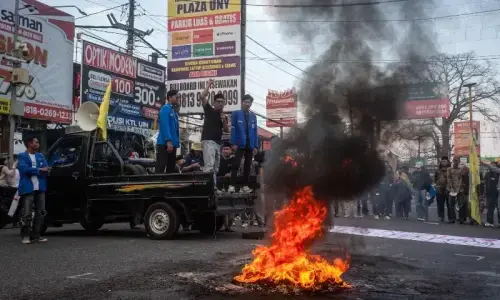
Indonesia’s military mobilizes amid talk of martial law.
Understanding Indonesia's Military Mobilization and the Debate Over Martial Law
Jakarta—(Special Correspondent/Web Desk)—The phrase “state of emergency” is trending online for a reason. This follows President Prabowo’s recent speech. He called the ongoing protests an act of treason. He then gave police and military full power to restore order.
In Jakarta, soldiers in camouflage are now highly visible. The military has started to deploy troops across the city. People saw dozens of armed soldiers on motorbikes and in trucks patrolling major streets. Some bystanders even cheered them on.
Notably, the police have been mostly absent from these scenes. They have faced public anger for their harsh handling of earlier demonstrations. A military commander stated these large patrols are for public safety after violent protests.
The army confirmed these troop movements are happening in major cities across Indonesia, not just the capital. Military leaders deny fears that this could lead to martial law. They say they have no plans to take extreme measures that would limit public freedoms.
A top general reaffirmed the military’s loyalty to the Constitution. He dismissed rumors that declaring martial law is being considered.
Today Currency Rates in Pakistan – 8 Sept 2025
However, for many Indonesians, the sight of soldiers on the streets is deeply worrying. It brings back memories of events from almost thirty years ago. They feel this is not the future they had hoped to build.
Last week’s peaceful protests sadly turned into riots and looting in some areas. Angry crowds broke into and damaged the homes of several government officials. Another group tried to attack a residential area in Bekasi where many ethnic Chinese families live.
This violence has reached a crisis level that the police are struggling to control. It feels like a painful repeat of past national tragedies. Even though the military denies it, the reality is that soldiers are now deployed in our cities. Indonesian law does allow the military to help police keep public order.
One official said over 76,000 troops are now guarding Jakarta. This large presence may be why President Prabowo felt he could leave for a scheduled visit to China. There are no exact numbers for troops in the area, but past reports suggest a large force is available.
Talk of martial law has grown, especially on social media. This is a direct reaction to the escalating protests and riots. In some cities, mobs have damaged public buildings and local legislative councils. A fire at one council building even led to tragic deaths.
If martial law is declared, it would mean the authorities have failed. It shows they could not find or fix the real reasons people are protesting. Citizens are on the streets because they are disappointed and angry with their government’s performance.
People are struggling with daily costs, while their representatives enjoy large benefits. For example, some officials receive a housing allowance that is ten times a citizen’s minimum wage.
This huge gap between leaders and ordinary people is a key cause of the unrest. So is the perceived arrogance of officials and the police’s use of strong force. The people’s demands for fair wages and good governance are their constitutional rights. These problems should not be solved by handing over power to the military.
Death toll surpasses 900 as torrential rains, floods devastate Pakistan
Current law states that martial law is only for extreme situations. This includes a large-scale rebellion, a major natural disaster, or a war that threatens the country’s existence.




Comments are closed, but trackbacks and pingbacks are open.